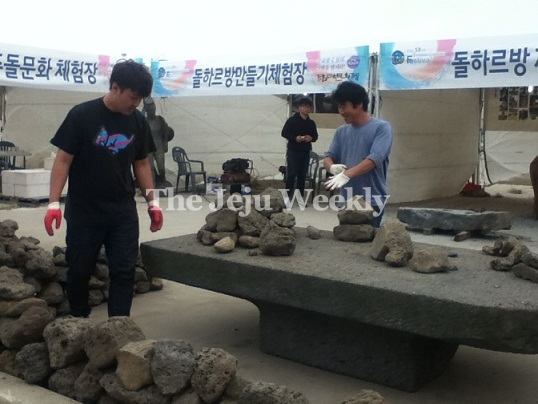| |
 |
|
| ▲ Photo by Able Team |
[This article is written by a JDC Junior Journalist. The JDC Junior Journalist program is an educational project sponsored by Jeju Free International City Development Corporation (JDC). JDC Junior Journalist articles are only briefly edited by mentors before publishing.]
Tamna Cultural Festival ,which has been held since 1962, is the Jeju’s oldest cultural festival. It takes place every year in Topdong, and this year was the 52th festival. It first began as the 'Jeju Art Festival' in 1962, but later it changed its name as 'Tamna Cultural Festival'. It is lead by private companies with the goal of becoming a tourism resource. The entire street becomes a festival and is disitnctive in it’s presentation of Jeju’s nature and history through unique folk plays.
The festival hold competitions in dialect play and myth story-telling to celebrat and introduce the Jeju culture. Lee Dong-soo, a teacher from Daejung Girls’ High School, teaches Jeju’s folk art performance call pungmul nori. Pungmul nori is one of the oldest and most popular folk arts of Korea deeply rooted in the country's traditionally agrarian lifestyle and culture. Pung means “wind” and mul means "thing" or "object", with nori meaning "play." It is perfomed to invoke blessings and repel evil spirits. So said, “Our students are leading this performance so that they can learn Jeju’s folk arts and also, Jeju’s own dialect. But one thing I hope is that this kind of festival lasts longer because it is a cultural learning expereince for students in Jeju.”
There were many artisan booths that introduce their jobs and artisan works. Once such artisan was Song Jong-won, a dolharubang maker. He has been carving traditional stone statues from volcanic rock, often referred to as “grandfather statues, for 50 years. Song says, “I am unsatifsifed that people from Jeju do not come to this kind of cultrual festival.” Another participant, an Onggi maker (Korean ethnic earthenware), shared her opinion. She hopes public institutions will make the festival more friendly to people of all ages.
The Tamna Cultrual Festival is a colorful and vibrant five days that provide the opportunity for Jeju residents and tourists to learn and better understand the history of Jeju. The many participants in the festival continue to work towards the preservation of this history for future generations. |




















